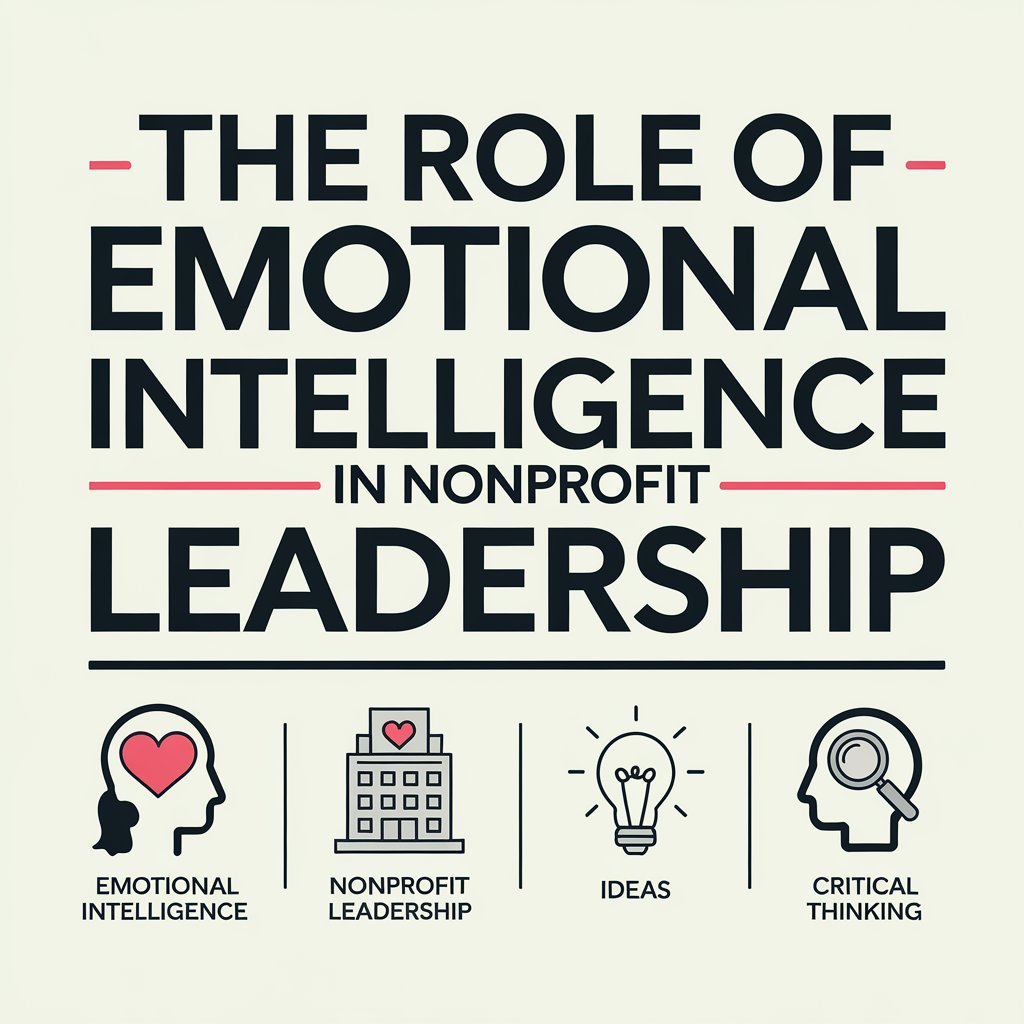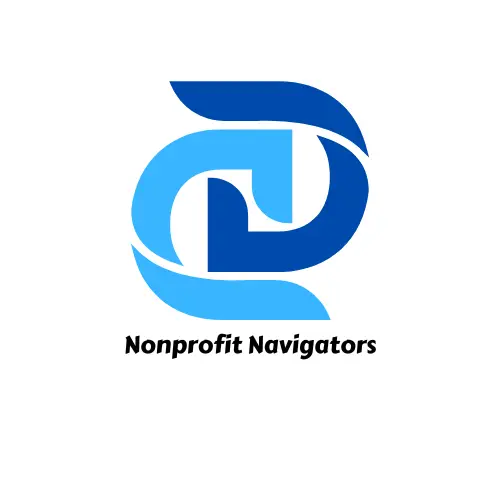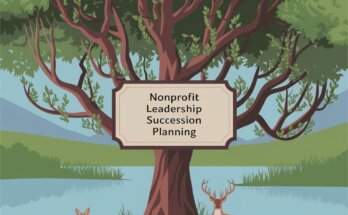The Role of Emotional Intelligence in Nonprofit Leadership is often overlooked, yet it plays a crucial part in driving success for any organization.
While nonprofit leaders are typically focused on fundraising, managing teams, and achieving mission-driven goals, emotional intelligence (EQ) provides the foundation for building strong relationships, fostering collaboration, and navigating the challenges that come with nonprofit work.
The ability to understand, manage, and influence emotions—both in yourself and others—can make all the difference in creating a thriving, resilient organization.
Emotional intelligence is the secret sauce that separates good leaders from great ones. It’s about understanding and managing your own emotions while recognizing and influencing the emotions of others.
But how exactly does emotional intelligence play a role in effective nonprofit leadership, and why is it so crucial?
What is Emotional Intelligence?
Emotional intelligence is the ability to recognize, understand, and manage your own emotions, as well as the emotions of others. In nonprofit leadership, where building relationships, fostering collaboration, and managing people are paramount, emotional intelligence is a game-changer.
Emotional intelligence is often broken down into four core components:
- Self-awareness: Understanding your own emotions and how they affect your behavior and decision-making.
- Self-regulation: Managing your emotions, particularly in stressful situations, and maintaining a calm, collected demeanor.
- Social awareness: Recognizing and understanding the emotions of others, especially those of your team, donors, and beneficiaries.
- Relationship management: Building and maintaining strong, effective relationships through empathy, communication, and conflict resolution.

Why Emotional Intelligence is Essential in Nonprofit Leadership
Nonprofit organizations operate in a unique environment. Leaders are not only responsible for ensuring the success of their programs but also for inspiring teams, managing limited resources, and building relationships with a wide range of stakeholders. Whether you’re motivating volunteers or working closely with funders, emotional intelligence plays a vital role in keeping your nonprofit moving forward.
The Link Between Emotional Intelligence and Strong Leadership
Nonprofit leaders with high emotional intelligence are often seen as more effective and influential. Why? Because they know how to connect with others on a deeper level, listen actively, and respond thoughtfully.
Practicing emotional intelligence helps create an atmosphere of trust, respect, and open communication. This is particularly crucial when managing teams of employees and volunteers who are motivated by passion and mission rather than financial incentives.
Think of it this way: A leader who is self-aware and empathetic can diffuse conflicts more easily, navigate difficult conversations with grace, and inspire their team to rally behind a shared vision.
How Nonprofit Leaders Can Develop Emotional Intelligence
Emotional intelligence isn’t something you either have or don’t have. It’s a skill that can be developed and nurtured over time.
Let’s explore each aspect of emotional intelligence and how it can be strengthened within nonprofit leadership.
1. Building Self-Awareness
As a nonprofit leader, being self-aware means understanding how your emotions affect your decision-making, relationships, and leadership style.
For example, if you’re feeling overwhelmed by the demands of fundraising, it’s important to recognize those emotions before they start affecting your behavior.
A lack of self-awareness can lead to frustration, poor decision-making, and ultimately, burnout.
Practical Example: Imagine you’re running a community outreach event, and the turnout is far below your expectations. Instead of lashing out at your team in frustration, take a moment to reflect on your feelings.
Are you upset because of the low attendance, or are you stressed because of the larger pressure to meet your nonprofit’s goals? Recognizing the root cause of your emotions allows you to respond calmly and constructively.
2. Practicing Self-Regulation
Self-regulation is the ability to manage your emotions, particularly in stressful situations. Nonprofit leaders often face tight deadlines, limited resources, and high expectations from their boards and funders. Being able to maintain a level head when things don’t go as planned is a mark of strong leadership.
Practical Example: You’re in the middle of a large fundraising campaign, and one of your biggest donors suddenly pulls out.
Instead of panicking or reacting impulsively, self-regulation allows you to take a step back, assess the situation calmly, and devise a plan to reach out to other potential donors.
3. Cultivating Social Awareness
Social awareness means having the ability to read the room. It’s about understanding the emotions and needs of others, whether they’re team members, volunteers, or beneficiaries. As a nonprofit leader, developing this skill can help you foster a more inclusive and supportive workplace culture.
Story Insert:
Take the example of Sarah, the executive director of a nonprofit focused on youth education. Sarah was preparing for an important staff meeting to discuss budget cuts due to lower-than-expected donations.
Her natural inclination was to dive straight into the facts and figures. However, Sarah had recently attended a workshop on emotional intelligence, and she decided to approach the meeting differently.
Before discussing numbers, Sarah took a moment to acknowledge the team’s hard work and the emotions everyone might be feeling in light of the budget cuts.
She shared her own concerns and invited the team to express their thoughts. By doing so, Sarah showed empathy and created a safe space for her staff to share their feelings.
The result? A more engaged, collaborative discussion where everyone felt heard and valued.
4. Mastering Relationship Management
Relationship management is crucial for nonprofit leaders, as so much of your success depends on building and maintaining positive relationships—with staff, volunteers, donors, and the communities you serve. Leaders who are skilled in this area are able to resolve conflicts, inspire their teams, and create a strong sense of community within their organizations.
Practical Example: You’re leading a nonprofit that relies heavily on volunteers, but lately, you’ve noticed a decline in volunteer retention.
Instead of assuming that volunteers simply lack commitment, take the time to reach out, ask for feedback, and listen to their concerns. By showing empathy and addressing their needs, you can create a stronger, more loyal volunteer base.
The Benefits of Emotional Intelligence for Nonprofit Organizations
When nonprofit leaders prioritize emotional intelligence, the benefits ripple through the entire organization. Here are a few key ways emotional intelligence can positively impact your nonprofit:
- Increased Employee Satisfaction: Teams led by emotionally intelligent leaders tend to report higher levels of job satisfaction. Why? Because these leaders create a supportive, empathetic work environment where everyone feels valued.
- Better Collaboration: Emotional intelligence fosters open communication, making it easier for teams to collaborate effectively. When employees and volunteers feel heard and respected, they’re more likely to work together toward common goals.
- Stronger Donor Relationships: Emotionally intelligent leaders know how to build strong relationships with donors by understanding their motivations and values. This can lead to long-term donor loyalty and increased funding opportunities.
- Improved Conflict Resolution: In any organization, conflicts are inevitable. But leaders with high emotional intelligence are better equipped to navigate these challenges with empathy and fairness, leading to more positive outcomes for everyone involved.
How to Apply Emotional Intelligence in Nonprofit Leadership
Now that we’ve covered the components of emotional intelligence, let’s look at how you can start applying these skills in your day-to-day leadership.
- Start with Self-Reflection: Take time to reflect on your own emotions and behaviors. Consider how your emotions affect your decisions, interactions with your team, and overall leadership style.
- Practice Active Listening: When engaging with your team, donors, or community members, make a conscious effort to listen without interrupting. This shows respect and helps build trust.
- Foster an Inclusive Culture: Encourage open dialogue and create a safe space for your team to express their thoughts and feelings. This not only boosts morale but also leads to more innovative solutions.
- Lead by Example: As a leader, your actions set the tone for the rest of the organization. By demonstrating emotional intelligence in your interactions, you’ll inspire others to follow suit.
- Invest in Emotional Intelligence Training: Consider offering emotional intelligence training for your team. The more emotionally intelligent your staff and volunteers are, the stronger your organization will become.
The Power of Emotional Intelligence in Action
Imagine a nonprofit leader who is known for their deep empathy, calm under pressure, and ability to bring people together.
This leader listens actively, communicates clearly, and navigates difficult conversations with grace. Their team is motivated, donors are engaged, and the organization thrives.
This is the power of emotional intelligence in action.
But here’s the thing—emotional intelligence isn’t just a natural gift; it’s a skill you can cultivate. Whether you’re already leading a nonprofit or aspiring to step into a leadership role, developing your emotional intelligence will help you build stronger relationships, make better decisions, and ultimately, lead your organization to greater success.
Take the Next Step
As you can see, emotional intelligence is the key to unlocking your full potential as a nonprofit leader. It’s not just about managing tasks or hitting goals—it’s about understanding and connecting with the people around you, from your team to your donors and the communities you serve.
Ready to take your leadership to the next level? Download, “Top 10 Donor Stewardship Strategies for Nonprofits + Free Donor Engagement Checklist,” and start mastering the essential skills that will elevate your nonprofit’s success.
And don’t forget to subscribe to the Nonprofit Navigators Newsletter for more expert tips, strategies, and resources designed to help your nonprofit thrive. Whether you’re looking to improve your leadership skills, boost your fundraising efforts, or build stronger relationships, we’ve got you covered!




